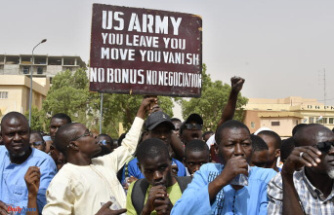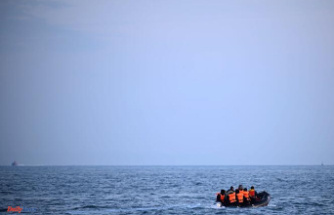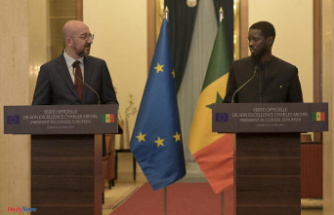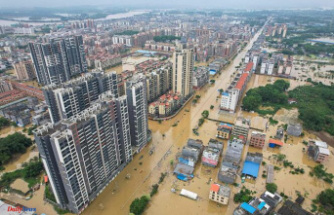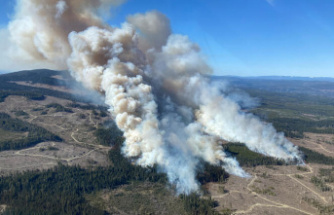WASHINGTON -- Eastern European countries are preparing for a refugee crisis in the event that Russia invades Ukraine. This could lead to millions of civilians crossing into neighboring countries.
According to U.S. officials briefed, European officials believe Russia and its allies will exploit any major migration for political purposes. This is to sow divisions in Europe and spread antirefugeee sentiment.
Ukrainian-speaking civilians would likely flee to European Union members on Ukraine's western frontier, Poland, Slovakia Hungary, Romania and Hungary if Russia attacked Ukraine. According to humanitarian organizations, Poland would absorb a large part of the initial wave.
Polish Radio's Maciej Wasik, Deputy Interior Minister of Poland, stated that "we must be prepared for the worst case scenario" and that he had been making preparations for a tsunami of as many as a million people.
Russian-speaking Ukrainians may choose to cross the border into Russia or Belarus, which are both aligned to Moscow. Numerous Russian-speaking Ukrainians fled Russia eight years ago during the initial stages of conflict in eastern Ukraine.
Baltic countries Latvia, Estonia, and Lithuania also stated that they were ready to accept refugees. Ukrainians could arrive from Poland, commercial flights or Poland. Latvia stated that it is looking into setting up refugee centers along its eastern border.
Experts said it is not clear if Poland and other European Union countries neighboring Ukraine have the ability to host refugees on such an enormous scale.
The Covid-19 vaccination rate in Ukraine is at 34%. EU authorities will also have to decide how to manage refugees, who will need to be tested for coronavirus and placed in quarantine.
Experts said that the EU, the U.S., and other governments would have to step in to provide financial support to countries that are absorbing the majority of the migration.
According to Sen. Chris Murphy (D-Conn.), a wave of refugees will "require major assistance from the United States." This was stated by NBC News.
"We are predicting a longer-term insurgency so this refugee flow will be incredibly acute initially, but it is likely to continue apace for months or years. Murphy stated that the transatlantic alliance will need to develop a long-term plan to handle Ukrainian refugees.
Jacob Kurtzer (a senior fellow at The Center for Strategic and International Studies) said that outside assistance will be crucial for Ukraine's neighboring countries.
Kurtzer, who has previously worked with the International Committee of the Red Cross, stated that "This will be an all hands-on-deck moment in Europe."
White House National Security Council spokesperson said that the Biden administration was "prepared for any scenario including this."
According to a spokesperson, the U.S. is working closely alongside European allies and partners, "who will be at the forefront of any response, along with international organizations and non-governmental organisations, on how best to support those who are internally displaced and those who may seek safety elsewhere,"
According to a spokesperson, the administration has a team that includes disaster specialists in Ukraine and other regions. They "monitoring closely" the situation.
According to experts and humanitarian organizations, European officials are having trouble planning for contingencies due to uncertainty around Russia's intentions. They don't know if Moscow will launch a small military operation or a large-scale attack that could impact the entire territory of Ukraine.
Lucian Bode, Romania's Interior Minister, said that his government has created an action plan to address a variety of situations. He said that his government is currently studying how many refugee camps can be set up in a relatively short period of time. This included 10, 12 and 24 hours.
According to U.S. officials communicating with European counterparts, European Union officials downplayed the estimates of as many as 1 million refugees that were cited by Poland and other Eastern European authorities. They stated that this would only be applicable in the event of an invasion.
According to U.S. officials, the EU expects a steady flow of Ukrainians heading west with some joining expatriate communities rather than a mass exodus.
Luigi Scazzieri (a senior research fellow at London's Centre for European Reform) said that a small intrusion would not cause a large number of refugees.
But a large-scale invasion could lead to millions of people being displaced. He said that it could be similar to 2015, when one million Syrians fled the civil war. "But, we don't know what Russia will say at this point."
About 1.5 million Ukrainians fled their homes after Russia invaded Ukraine in 2014. In 2014, Moscow annexed and seized the Crimean peninsula. However, most remained in Ukraine.
The U.N. High Commission for Refugees stated that it wasn't ready to give an estimate of the number of people who might be affected by a new conflict and how many would attempt to flee the country.
Viktoria Andrievska, UNHCR Kyiv, stated that "at this point the scenario remains highly unpredictable.
She stated that "the U.N. and its humanitarian partners, Ukraine," hoped that tensions would not escalate and could be resolved diplomatically and politically among all parties.
In the last decade, Europe has experienced two refugee crises. More than 2 million refugees fled conflict-ridden former Yugoslavia in the 1990s to seek refuge in northern Europe. More recently, over 3 million Syrian civil war refugees sought asylum in the EU from 2011 to 2016.
Political turmoil in Europe was caused by the migration triggered by the conflict in Syria. Anti-immigrant politicians tried to block the admission of mostly Muslim refugees. They argued that they were a threat to Europe’s secular customs. Some governments also wondered if those fleeing economic hardship should be granted asylum in the EU.
"I believe here, seeing Ukrainian refugees arriving as a consequence of a Russian invasion. I would expect that the European response will be much more open-minded and welcoming than we have seen for other non European groups," stated Daphne Panayotatos (Nonprofit Refugees International), advocate for Europe.
Europe has the resources to deal with an influx of Ukrainian refugees, it's just a matter of "political will", she stated.
Poland pledged solidarity to Ukraine. It said that civilians fleeing Russian aggression would be welcomed, since their status as refugees is unambiguous.
Ukrainian citizens can travel to the EU without a visa. The country also shares a border (with the EU states Poland Slovakia, Hungary, Hungary, and Romania)
"In the event of a large-scale influx of people sparked by conflict in Ukraine, it would be unambiguous," stated Scazzieri, of the London-based Centre for European Reform.
Analysts and western governments accused Russia of using refugees during Europe's most recent migration crisis as a political weapon. They also supported far-right anti-immigration parties in order to create turmoil in Europe. Moscow denied these accusations.
According to U.S. officials, EU officials believe that there is a possibility for migration to again be exploited in the current conflict between Russia and Ukraine.
Russian President Vladimir Putin's long term goal is to "destroy NATO and the transatlantic alliance," stated Sen. Murphy. He also said he would attempt to use a refugee crisis in Ukraine as a political weapon.
"I don't doubt that he could take the refugee flow from Ukraine in the same manner as he took the refugee flow from the Middle East. Murphy stated that it was another way to try and divide Europeans." "And if there is tens of thousands or hundreds of thousand of refugees from Ukraine coming into Europe, that will cause stress in Europe. This is also to his advantage."
John Herbst, the former U.S. ambassador in Ukraine, stated that he was skeptical Putin would be able to take advantage of a refugee crisis. He will, I have no doubt. Putin's position will be made more difficult by the presence of refugees from Eastern Europe. It will become clear who is responsible.
Near the front line of the country's eastern regions, approximately 2 million people, many of whom are elderly, live in an area where the Ukrainian government and Russian-backed troops are at a standstill. Civilians in the area are already facing hardships due to a lack of basic services and restricted movement by military checkpoints. Humanitarian groups claim that a wider war, triggered by a Russian military attack, would be devastating for this population.
Jan Egeland (secretary general of the Norwegian Refugee Council) stated that "we must not underestimate human suffering from renewed conflict -- it will result in increased civilian casualties and massive displacement, and soaring humanitarian need."
He said that an escalation in the conflict could have a "deadly impact on already damaged civil infrastructure, further restricting movements and disrupting vital public services like water, power and transport."


